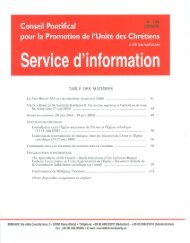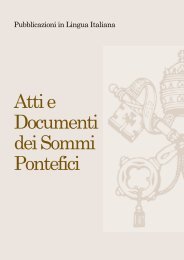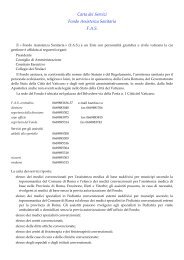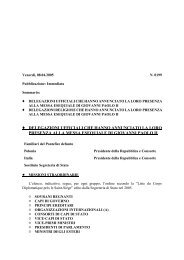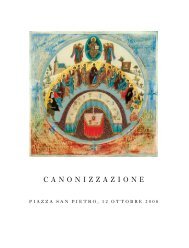- Page 1:
ACTA APOSTOLICAE SEDIS COMMENTARIUM
- Page 6 and 7:
6 Acta Apostolicae Sedis - Commenta
- Page 8 and 9:
8 Acta Apostolicae Sedis - Commenta
- Page 10 and 11:
10 Acta Apostolicae Sedis - Comment
- Page 12 and 13:
12 Acta Apostolicae Sedis - Comment
- Page 14 and 15:
14 Acta Apostolicae Sedis - Comment
- Page 16 and 17:
16 Acta Apostolicae Sedis - Comment
- Page 18 and 19:
18 Acta Apostolicae Sedis - Comment
- Page 20 and 21:
20 Acta Apostolicae Sedis - Comment
- Page 22 and 23:
22 Acta Apostolicae Sedis - Comment
- Page 24 and 25:
24 Acta Apostolicae Sedis - Comment
- Page 26 and 27:
26 Acta Apostolicae Sedis - Comment
- Page 28 and 29:
28 Acta Apostolicae Sedis - Comment
- Page 30 and 31:
30 Acta Apostolicae Sedis - Comment
- Page 32 and 33:
32 Acta Apostolicae Sedis - Comment
- Page 34 and 35:
34 Acta Apostolicae Sedis - Comment
- Page 36 and 37:
36 Acta Apostolicae Sedis - Comment
- Page 38 and 39:
38 Acta Apostolicae Sedis - Comment
- Page 40 and 41:
40 Acta Apostolicae Sedis - Comment
- Page 42 and 43:
42 Acta Apostolicae Sedis - Comment
- Page 44 and 45:
44 Acta Apostolicae Sedis - Comment
- Page 46 and 47:
46 Acta Apostolicae Sedis - Comment
- Page 48 and 49:
48 Acta Apostolicae Sedis - Comment
- Page 50 and 51:
50 Acta Apostolicae Sedis - Comment
- Page 52 and 53:
52 Acta Apostolicae Sedis - Comment
- Page 54 and 55:
54 Acta Apostolicae Sedis - Comment
- Page 56 and 57:
56 Acta Apostolicae Sedis - Comment
- Page 58 and 59:
58 Acta Apostolicae Sedis - Comment
- Page 60 and 61:
60 Acta Apostolicae Sedis - Comment
- Page 62 and 63:
62 Acta Apostolicae Sedis - Comment
- Page 64 and 65:
64 Acta Apostolicae Sedis - Comment
- Page 66 and 67:
66 Acta Apostolicae Sedis - Comment
- Page 68 and 69:
68 Acta Apostolicae Sedis - Comment
- Page 70 and 71:
70 Acta Apostolicae Sedis - Comment
- Page 72 and 73:
72 Acta Apostolicae Sedis - Comment
- Page 74 and 75:
74 Acta Apostolicae Sedis - Comment
- Page 76 and 77:
76 Acta Apostolicae Sedis - Comment
- Page 78 and 79:
78 Acta Apostolicae Sedis - Comment
- Page 80 and 81:
80 Acta Apostolicae. Sedis - Commen
- Page 82 and 83:
82 Acta Apostolicae Sedis — Comme
- Page 84 and 85:
84 Acta Apostolicae Sedis - Comment
- Page 86 and 87:
86 Acta Apostolicae Sedis - Comment
- Page 88 and 89:
88 Acta Apostolicae Sedis - Comment
- Page 90 and 91:
90 Acta Apostolicae Sedis - Comment
- Page 92 and 93:
92 Acta Apostolicae Sedis - Comment
- Page 94 and 95:
94 Acta Apostolicae Sedis - Comment
- Page 96 and 97:
96 Acta Apostolicae Sedis - Comment
- Page 98 and 99:
98 ? Acta Apostolicae Sedis - Comme
- Page 100 and 101:
100 Acta Apostolicae Sedis - Commen
- Page 102 and 103:
102 Acta Apostolicae Sedis - Commen
- Page 104 and 105:
104 Acta Apostolicae Sedis - Commen
- Page 106 and 107:
106 Acta Apostolicae Sedis - Commen
- Page 108 and 109:
108 Acta Apostolicae Sedis - Commen
- Page 110 and 111:
110 Acta Apostolicae Sedis - Commen
- Page 112 and 113:
112 Acta Apostolicae Sedis - Commen
- Page 114 and 115:
114 Acta Apostolicae Sedis - Commen
- Page 116 and 117:
116 Acta Apostolicae Sedis - Commen
- Page 118 and 119:
118 Acta Apostolicae Sedis - Commen
- Page 120 and 121:
120 Acta Apostolicae Sedis - Commen
- Page 122 and 123:
122 Acta Apostolicae Sedis - Commen
- Page 124 and 125:
124 Acta Apostolicae Sedis - Commen
- Page 126 and 127:
126 Acta Apostolicae Sedis - Commen
- Page 128 and 129:
128 Acta Apostolicae Sedis - Commen
- Page 130 and 131:
130 Acta Apostolicae Sedis - Commen
- Page 132 and 133:
132 Acta Apostolicae Sedis - Commen
- Page 134 and 135:
134 Acta Apostolicae Sedis - Commen
- Page 136 and 137:
136 Acta Apostolicae Sedis - Commen
- Page 138 and 139:
138 Acta Apostolicae Sedis - Commen
- Page 140 and 141:
140 Acta Apostolicae Sedis - Commen
- Page 142 and 143:
142 Acta Apostolicae Sedis - Commen
- Page 144 and 145:
144 Acta Apostolicae Sedis - Commen
- Page 146 and 147:
146 Acta Apostolicae Sedis - Commen
- Page 148 and 149:
148 Acta Apostolicae Sedis - Commen
- Page 150 and 151:
150 Acta Apostolicae Sedis - Commen
- Page 152 and 153:
152 Acta Apostolicae Sedis - Commen
- Page 154 and 155:
154 Acta Apostolicae Sedis - Commen
- Page 156 and 157:
156 Acta Apostolicae Sedis - Commen
- Page 158 and 159:
158 Acta Apostolicae Sedis - Commen
- Page 160 and 161:
160 Acta Apostolicae Sedis - Commen
- Page 162 and 163:
162 Acta Apostolicae Sedis - Commen
- Page 164 and 165:
164 Acta Apostolicae Sedis - Commen
- Page 166 and 167:
166 Acta Apostolicae Sedis - Commen
- Page 168 and 169:
168 Acta Apostolicae Sedis - Commen
- Page 170 and 171:
170 Acta Apostolicae Sedis - Commen
- Page 172 and 173:
172 Acta Apostolicae Sedis - Commen
- Page 174 and 175:
174 Acta Apostolicae Sedis - Commen
- Page 176 and 177:
176 Acta Apostolicae Sedis - Commen
- Page 178 and 179:
178 Acta Apostolicae Sedis - Commen
- Page 180 and 181:
180 Acta Apostolicae Sedis - Commen
- Page 182 and 183:
182 Acta Apostolicae Sedis - Commen
- Page 184 and 185:
184 Acta Apostolicae Sedis - Commen
- Page 186 and 187:
186 Acta Apostolicae Sedis - Commen
- Page 188 and 189:
188 Acta Apostolicae Sedis - Commen
- Page 190 and 191:
190 Acta Apostolicae Sedis - Commen
- Page 192 and 193:
192 Acta Apostolicae Sedis - Commen
- Page 194 and 195:
194 Acta Apostolicae Sedis - Commen
- Page 196 and 197:
196 Acta Apostolicae Sedis - Commen
- Page 198 and 199:
198 Acta Apostolicae Sedis - Commen
- Page 200 and 201:
200 Acta Apostolicae Sedis - Commen
- Page 202 and 203:
202 Acta Apostolicae Sedis - Commen
- Page 204 and 205:
204 Acta Apostolicae Sedis - Commen
- Page 206 and 207:
206 Acta Apostolicae Sedis - Commen
- Page 208 and 209:
208 Acta Apostolicae Sedis - Commen
- Page 210 and 211:
210 Acta Apostolicae Sedis - Commen
- Page 212 and 213:
212 Acta Apostolicae Sedis - Commen
- Page 214 and 215:
214 Acta Apostolicae Sedis - Commen
- Page 216 and 217:
216 Acta Apostolicae Sedis - Commen
- Page 218 and 219:
218 Acta Apostolicae Sedis - Commen
- Page 220 and 221:
220 Acta Apostolicae Sedis - Commen
- Page 222 and 223:
222 Acta Apostolicae Sedis - Commen
- Page 224 and 225:
224 Acta Apostolicae Sedis - Commen
- Page 226 and 227:
226 Acta Apostolicae Sedis - Commen
- Page 228 and 229:
Acta Apostolicae Sedis - Commentari
- Page 230 and 231:
230 Acta Apostolicae Sedis - Commen
- Page 232 and 233:
232 Acta Apostolicae Sedis - Commen
- Page 234 and 235:
234 Acta Apostolicae Sedis - Commen
- Page 236 and 237:
236 Acta Apostolicae Sedis - Commen
- Page 238 and 239:
238 Acta Apostolicae Sedis - Commen
- Page 240 and 241:
240 Acta Apostolicae Sedis - Commen
- Page 242 and 243:
242 Acta Apostolicae Sedis - Commen
- Page 244 and 245:
244 Acta Apostolicae Sedis - Commen
- Page 246 and 247:
246 Acta Apostolicae Sedis - Commen
- Page 248 and 249:
248 Acta Apostolicae Sedis — Comm
- Page 250 and 251:
250 Acta Apostolicae Sedis - Commen
- Page 252 and 253:
252 Acta Apostolicae Sedis - Commen
- Page 254 and 255:
254 Acta Apostolicae Sedis - Commen
- Page 256 and 257:
256 Acta Apostolicae Sedis - Commen
- Page 258 and 259:
258 Acta Apostolicae Sedis - Commen
- Page 260 and 261:
260 Acta Apostolicae Sedis - Commen
- Page 262 and 263:
262 Acta Apostolicae Sedis - Commen
- Page 264 and 265:
264 Acta Apostolicae Sedis - Commen
- Page 266 and 267:
266 Acta Apostolicae Sedis - Commen
- Page 268 and 269:
268 Acta Apostolicae Sedis - Commen
- Page 270 and 271:
270 Acta Apostolicae Sedis - Commen
- Page 272 and 273:
272 Acta Apostolicae Sedis - Commen
- Page 274 and 275:
274 Acta Apostolicae Sedis - Commen
- Page 276 and 277:
276 Acta Apostolicae Sedis - Commen
- Page 278 and 279:
278 Acta Apostolicae Sedis - Commen
- Page 280 and 281:
280 Acta Apostolicae Sedis - Commen
- Page 282 and 283:
282 Acta Apostolicae Sedis - Commen
- Page 284 and 285:
284 Acta Apostolicae Sedis - Commen
- Page 286 and 287:
286 Acta, Apostolicae Sedis - Comme
- Page 288 and 289:
288 Acta Apostolicae Sedis - Commen
- Page 290 and 291:
290 Acta Apostolicae Sedis - Commen
- Page 292 and 293:
292 Acta Apostolicae Sedis - Commen
- Page 294 and 295:
294 Acta Apostolicae Sedis - Commen
- Page 296 and 297:
296 Acta Apostolicae Sedis - Commen
- Page 298 and 299:
298 Acta Apostolicae Sedis - Commen
- Page 300 and 301:
300 Acta Apostolicae Sedis - Commen
- Page 302 and 303:
302 Acta Apostolicae Sedis - Commen
- Page 304 and 305:
304 Acta Apostolicae Sedis - Commen
- Page 306 and 307:
306 Acta Apostolicae Sedis - Commen
- Page 308 and 309:
308 Acta Apostolicae Sedis - Commen
- Page 310 and 311:
310 Acta Apostolicae Sedis - Commen
- Page 312 and 313:
312 Acta Apostolicae Sedis - Commen
- Page 314 and 315:
314 Acta Apostolicae Sedis - Commen
- Page 316 and 317:
316 Acta Apostolicae Sedis - Commen
- Page 318 and 319:
318 Acta Apostolicae Sedis - Commen
- Page 320 and 321:
320 Acta Apostolicae Sedis - Commen
- Page 322 and 323:
322 Acta Apostolicae Sedis - Commen
- Page 324 and 325:
324 Acta Apostolicae Sedis - Commen
- Page 326 and 327:
326 Acta Apostolicae Sedis - Commen
- Page 328 and 329:
328 Acta Apostolicae Sedis - Commen
- Page 330 and 331:
330 Acta Apostolicae Sedis - Commen
- Page 332 and 333:
332 Acta Apostolicae Sedis - Commen
- Page 334 and 335:
334 Acta Apostolicae Sedis - Commen
- Page 336 and 337:
336 Acta Apostolicae Sedis - Commen
- Page 338 and 339:
338 Acta Apostolicae Sedis - Commen
- Page 340 and 341:
340 Acta Apostolicae Sedis - Commen
- Page 342 and 343:
342 Acta Apostolicae Sedis - Gommen
- Page 344 and 345:
344 Acta Apostolicae Sedis - Commen
- Page 346 and 347:
346 Acta Apostolicae Sedis - Commen
- Page 348 and 349:
348 Acta Apostolicae Sedia - Commen
- Page 350 and 351:
350 Acta Apostolicae Sedis - Commen
- Page 352 and 353:
352 Acta Apostolicae Sedis - Commen
- Page 354 and 355:
354 Acta Apostolicae Sedis - Commen
- Page 356 and 357:
356 Acta Apostolicae Sedis - Commen
- Page 358 and 359:
358 Acta Apostolicae Sectis - Comme
- Page 360 and 361:
360 Acta Apostolicae Sedis - Commen
- Page 362 and 363:
362 Acta Apostolicae Sedis - Commen
- Page 364 and 365:
364 Acta Apostolicae Sedis - Commen
- Page 366 and 367:
366 Acta Apostolicae Sedis - Commen
- Page 368 and 369:
368 Acta Apostolicae Sedis - Commen
- Page 370 and 371:
370 Acta Apostolicae Sedis - Commen
- Page 372 and 373:
372 Acta Apostolicae Sedis - Commen
- Page 374 and 375:
374 Acta Apostolicae Sedis - Commen
- Page 376 and 377:
376 Acta Apostolicae Sedis - Commen
- Page 378 and 379:
378 Acta Apostolicae Sedis - Commen
- Page 380 and 381:
380 Acta Apostolicae Sedis - Commen
- Page 382 and 383:
382 Acta Apostolicae Sedis - Commen
- Page 384 and 385:
384 Acta Apostolicae Sedis - Commen
- Page 386 and 387:
386 Acta Apostolicae Sedis - Commen
- Page 388 and 389:
388 Acta Apostolicae Sedis - Commen
- Page 390 and 391:
390 Acta Apostolicae Sedis - Commen
- Page 392 and 393:
392 Acta Apostolicae Sedis - Commen
- Page 394 and 395:
394 Acta Apostolicae Sedis - Commen
- Page 396 and 397:
396 Acta Apostolicae Sedis - Commen
- Page 398 and 399:
398 Acta Apostolicae Sedis - Commen
- Page 400 and 401:
400 Acta Apostolicae Sedis - Commen
- Page 402 and 403:
402 Acta Apostolicae Sedis - Commen
- Page 404 and 405:
404 Acta Apostolicae Sedis - Commen
- Page 406 and 407:
406 Acta Apostolicae Sedis - Commen
- Page 408 and 409:
408 Acta Apostolicae Sedis - Commen
- Page 410 and 411:
410 Acta Apostolicae Sedis - Commen
- Page 412 and 413:
412 Acta Apostolicae Sedis - Commen
- Page 414 and 415:
414 Acta Apostolicae Sedis - Commen
- Page 416 and 417:
416 Acta Apostolicae Sedis - Commen
- Page 418 and 419:
418 Acta Apostolicae Sedis - Commen
- Page 420 and 421:
420 Acta Apostolicae Sedis - Commen
- Page 422 and 423:
422 Acta Apostolicae Sedis - Commen
- Page 424 and 425:
424 Acta Apostolicae Sedis - Commen
- Page 426 and 427:
426 Acta Apostolicae Sedis - Commen
- Page 428 and 429:
428 Acta Apostolicae Sedis - Commen
- Page 430 and 431:
430 Acta Apostolicae Sedis - Commen
- Page 432 and 433:
432 Acta Apostolicae Sedis - Commen
- Page 434 and 435:
434 Acta Apostolicae Sedis - Commen
- Page 436 and 437:
436 Acta Apostolicae Sedis - Commen
- Page 438 and 439:
438 Acta Apostolicae Sedis - Commen
- Page 440 and 441:
440 Acta Apostolicae Sedis - Commen
- Page 442 and 443:
442 Acta Apostolicae Sedis - Commen
- Page 444 and 445:
444 Acta Apostolicae Sedis - Commen
- Page 446 and 447:
446 Acta Apostolicae Sedis - Commen
- Page 448 and 449:
448 Acta Apostolicae Sedis - Commen
- Page 450 and 451:
450 Acta Apostolicae Sedis - Commen
- Page 452 and 453:
452 Acta Apostolicae Sedis - Commen
- Page 454 and 455:
454 Acta Apostolicae Sedie - Commen
- Page 456 and 457:
456 Acta Apostolicae Sedis - Commen
- Page 458 and 459:
458 Acta Apostolicae Sedis - Commen
- Page 460 and 461:
460 Acta Apostolicae Sedis - Commen
- Page 462 and 463:
462 Acta Apostolicae Sedis - Commen
- Page 464 and 465:
464 Acta Apostolicae Sedis - Commen
- Page 466 and 467:
466 Acta Apostolicae Sedis - Commen
- Page 468 and 469:
468 Acta Apostolicae Sedis - Commen
- Page 470 and 471:
470 Acta Apostolicae Sedis - Commen
- Page 472 and 473:
472 Acta Apostolicae Sedis - Commen
- Page 474 and 475:
474 Acta Apostolicae Sedis - Commen
- Page 476 and 477:
476 Acta Apostolicae Sedis - Commen
- Page 478 and 479:
478 Acta Apostolicae Sedis - Commen
- Page 480 and 481:
480 Acta Apostolicae Sedis - Commen
- Page 482 and 483:
482 Acta Apostolicae Sedis - Commen
- Page 484 and 485:
484 Acta Apostolicae Sedis - Commen
- Page 486 and 487:
486 Acta Apostolicae Sedis - Commen
- Page 488 and 489:
488 Acta Apostolicae Sedis - Commen
- Page 490 and 491:
490 Acta Apostolicae Sedis - Commen
- Page 492 and 493:
492 Acta Apostolicae Sedis - Commen
- Page 494 and 495:
494 Acta Apostolicae Sedis - Commen
- Page 496 and 497:
496 Acta Apostolicae Sedis - Commen
- Page 498 and 499:
498 Acta Apostolicae Sedis - Commen
- Page 500 and 501:
500 Acta Apostolicae Sedis - Commen
- Page 502 and 503:
502 Acta Apostolicae Sectis - Comme
- Page 504 and 505:
504 Acta Apostolicae Sedis - Commen
- Page 506 and 507:
506 Acta Apostolicae Sedis - Commen
- Page 508 and 509:
508 Acta Apostolicae Sedis - Commen
- Page 510 and 511:
510 Acta Apostolicae Sedis - Commen
- Page 512 and 513:
512 Acta Apostolicae Sedis - Commen
- Page 514 and 515:
514 Acta Apostolicae Sedis - Commen
- Page 516 and 517:
516 Acta Apostolicae Sedis - Commen
- Page 518 and 519:
518 Acta Apostolicae Sedis - Commen
- Page 520 and 521:
520 Acta Apostolicae Sedis - Commen
- Page 522 and 523:
522 Acta Apostolicae Sedis - Commen
- Page 524 and 525:
524 Acta Apostolicae Sedis - Commen
- Page 526 and 527:
526 Acta Apostolicae Sedis - Commen
- Page 528 and 529:
528 Acta Apostolicae Sedis - Commen
- Page 530 and 531:
530 Acta, Apostolicae Sedis - Comme
- Page 532 and 533:
532 Acta Apostolicae Sedis - Commen
- Page 534 and 535:
534 Acta Apostolicae Sedis - Commen
- Page 536 and 537:
536 Acta Apostolicae Sedis - Commen
- Page 538 and 539:
538 Acta Apostolicae Sedis - Commen
- Page 540 and 541:
540 Acta Apostolicae Sedis - Commen
- Page 542 and 543:
542 Acta Apostolicae Sedis - Commen
- Page 544 and 545:
544 Acta Apostolicae Sedis - Commen
- Page 546 and 547:
546 Acta Apostolicae Sedis - Commen
- Page 548 and 549:
548 Acta Apostolicae Sedis - Commen
- Page 550 and 551:
550 Acta Apostolicae Sedis - Commen
- Page 552 and 553:
552 Acta Apostolicae Sedis - Commen
- Page 554 and 555:
664 Acta Apostolicae Sedis - Commen
- Page 556 and 557:
556 Acta Apostolicae Sedis - Commen
- Page 558 and 559:
558 Acta Apostolicae Sedis - Commen
- Page 560 and 561:
560 Acta Apostolicae Sedis - Commen
- Page 562 and 563:
562 Acta Apostolicae Sedis - Commen
- Page 564 and 565:
564 Acta Apostolicae Sedis - Commen
- Page 566 and 567:
566 Acta Apostolicae Sedis - Commen
- Page 568 and 569:
568 Acta Apostolicae Sedis - Commen
- Page 570 and 571:
570 Acta Apostolicae Sedis -r Comme
- Page 572 and 573:
572 Acta Apostolicae Sedis - Commen
- Page 574 and 575:
574 Acta Apostolicae Sedis - Commen
- Page 576 and 577:
576 Acta Apostolicae Sedis - Commen
- Page 578 and 579:
578 Acta Apostolicae Sedis - Commen
- Page 580 and 581:
580 Acta Apostolicae Sedis - Commen
- Page 582 and 583:
582 Acta Apostolicae Sedis - Commen
- Page 584 and 585:
584 Acta Apostolicae Sedis - Commen
- Page 586 and 587:
586 Acta Apostolicae Sedis - Commen
- Page 588 and 589:
588 Acta Apostolicae Sedis - Commen
- Page 590 and 591:
590 Acta Apostolicae Sedis - Commen
- Page 592 and 593:
592 Acta Apostolicae Sedis - Commen
- Page 594 and 595:
594 Acta Apostolicae Sedis - Commen
- Page 596 and 597:
596 Acta Apostolicae Sedis - Commen
- Page 598 and 599:
598 Acta Apostolicae Sedis — Comm
- Page 600 and 601:
600 Acta Apostolicae Sedis - Commen
- Page 602 and 603:
602 Acta Apostolicae Sedis - Commen
- Page 604 and 605:
604 Acta Apostolicae Sedis - Commen
- Page 606 and 607:
606 Acta Apostolicae Sedis - Commen
- Page 608 and 609:
608 Acta Apostolicae Sedis - Commen
- Page 610 and 611:
610 Acta Apostolicae Sedis - Commen
- Page 612 and 613:
612 Acta Apostolicae Sedis - Commen
- Page 614 and 615:
614 Acta Apostolicae Sedis - Commen
- Page 616 and 617:
616 Acta Apostolicae Sedis - Commen
- Page 618 and 619:
618 Acta Apostolicae Sedis - Commen
- Page 620 and 621:
620 Acta Apostolicae Sedis - Commen
- Page 622 and 623:
622 Acta, Apostolicae Sedis - Comme
- Page 624 and 625:
624 Acta Apostolicae Sedis - Commen
- Page 626 and 627:
626 Acta Apostolicae Sedis - Commen
- Page 628 and 629:
628 Acta Apostolicae Sedis - Commen
- Page 630 and 631:
630 Acta Apostolicae Sedis - Commen
- Page 632 and 633:
632 Acta Apostolicae Sedis - Commen
- Page 634 and 635:
634 Acta Apostolicae Sedis - Commen
- Page 636 and 637:
636 Acta Apostolicae Sedis - Commen
- Page 638 and 639:
638 Acta Apostolicae Sedis - Commen
- Page 640 and 641:
640 Acta Apostolicae Sedis - Commen
- Page 642 and 643:
642 Acta Apostolicae Sedis - Commen
- Page 644 and 645:
644 Acta Apostolicae Sedis - Commen
- Page 646 and 647:
646 Acta Apostolicae Sedis - Commen
- Page 648 and 649:
648 Acta Apostolicae Sedis - Commen
- Page 650 and 651:
650 Acta Apostolicae Sedis - Commen
- Page 652 and 653:
652 Acta Apostolicae Sedis - Commen
- Page 654 and 655:
654 Acta Apostolicae Sedis - Commen
- Page 656 and 657:
656 Acta Apostolicae Sedis - Commen
- Page 658 and 659:
658 Acta Apostolicae Sedis - Commen
- Page 660 and 661:
660 Acta Apostolicae Sedis - Commen
- Page 662 and 663:
662 Acta Apostolicae Sedis - Commen
- Page 664 and 665:
664 Acta Apostolicae Sedis - Commen
- Page 666 and 667:
666 Acta Apostolicae Sedis - Commen
- Page 668 and 669:
668 Acta, Apostolicae Sedis - Comme
- Page 670 and 671:
670 Acta Apostolicae Sedis - Commen
- Page 672 and 673:
672 Acta Apostolicae Sedis - Commen
- Page 674 and 675:
674 Acta Apostolicae Sedis - Commen
- Page 676 and 677:
676 Acta Apostolicae Sedis - Commen
- Page 678 and 679:
678 Acta Apostolicae Sedis - Commen
- Page 680 and 681:
680 Acta Apostolicae Sedis - Commen
- Page 682 and 683:
682 Acta Apostolicae Sedis - Commen
- Page 684 and 685:
684 Acta Apostolicae Sedis - Commen
- Page 686 and 687:
686 Acta Apostolicae Sedis - Commen
- Page 688 and 689:
688 Acta Apostolicae Sedis - Commen
- Page 690 and 691:
690 Acta Apostolicae Sedis - Commen
- Page 692 and 693:
692 Acta Apostolicae Sedis - Commen
- Page 694 and 695:
694 Acta Apostolicae Sedis - Commen
- Page 696 and 697:
696 Acta Apostolicae Sedis - Commen
- Page 698 and 699:
698 Acta Apostolicae S#dis - Commen
- Page 700 and 701:
700 Acta Apostolicae Sedis - Commen
- Page 702 and 703:
702 Acta Apostolicae Sedis - Commen
- Page 704 and 705:
704 Acta Apostolicae Sedis - Commen
- Page 706 and 707:
706 Acta Apostolicae Sedis - Commen
- Page 708 and 709:
708 Acta Apostolicae Sedis - Commen
- Page 710 and 711:
710 Acta Apostolicae Sedis - Commen
- Page 712 and 713:
712 Acta Apostolicae Sedis - Commen
- Page 714 and 715:
714 Acta Apostolicae Sedis - Commen
- Page 716 and 717:
716 Acta Apostolicae Sedis - Commen
- Page 718 and 719:
718 Acta Apostolicae Sedis - Commen
- Page 720 and 721:
720 Acta Apostolicae Sedis - Commen
- Page 722 and 723:
722 Acta Apostolicae Sedis - Commen
- Page 724 and 725:
724 Acta Apostolicae Sedis - Commen
- Page 726 and 727:
726 Acta Apostolicae Sedis - Commen
- Page 728 and 729:
728 Acta Apostolicae Sedis - Commen
- Page 730 and 731:
730 Acta Apostolicae Sedis - Commen
- Page 732 and 733:
732 Acta Apostolicae Sedis - Commen
- Page 734 and 735:
734 Acta Apostolicae Sedis - Commen
- Page 736 and 737:
736 Acta Apostolicae Sedis - Commen
- Page 738 and 739:
738 Acta Apostolicae Sedis - Commen
- Page 740 and 741:
740 Acta Apostolicae Sedis - Commen
- Page 742 and 743:
742 Acta Apostolicae Sedis - Commen
- Page 744 and 745:
744 Acta Apostolicae Sedis - Commen
- Page 746 and 747:
746 Acta Apostolicae Sedis - Commen
- Page 748 and 749:
748 Acta Apostolicae Sedis - Commen
- Page 750 and 751:
750 Acta Apostolicae Sedis - Commen
- Page 752 and 753:
752 Acta Apostolicae Sedis - Commen
- Page 754 and 755:
754 Acta Apostolicae Sedis - Commen
- Page 756 and 757:
756 Acta Apostolicae Sedis - Commen
- Page 758 and 759:
758 Acta Apostolicae Sedis - Commen
- Page 760 and 761:
760 Acta Apostolicae Sedis - Commen
- Page 762 and 763:
762 Acta Apostolicae Sedis - Commen
- Page 764 and 765:
764 Acta Apostolicae Sedis - Commen
- Page 766 and 767:
766 Acta Apostolicae Sedis - Commen
- Page 768 and 769:
768 Acta Apostolicae Sedis - Commen
- Page 770 and 771:
770 Acta Apostolicae Sedis - Commen
- Page 772 and 773:
772 Acta Apostolicae Sedis - Commen
- Page 774 and 775:
774 Acta Apostolicae Sedis - Commen
- Page 776 and 777:
776 Acta Apostolicae Sedis - Commen
- Page 778 and 779:
778 Acta Apostolicae Sedis - Commen
- Page 780 and 781:
780 Acta Apostolicae Sedis - Commen
- Page 782 and 783:
782 Acta Apostolicae Sedis - Commen
- Page 784 and 785:
784 Acta Apostolicae Sedis - Commen
- Page 786 and 787:
786 Acta Apostolicae Sedis - Commen
- Page 788 and 789:
7,88 Acta Apostolicae Sedis - Comme
- Page 790 and 791:
790 Acta, Apostolicae Sedis - Comme
- Page 792 and 793:
792 Acta Apostolicae Sedis - Commen
- Page 794 and 795:
794 Acta Apostolicae Sedis - Commen
- Page 796 and 797:
796 Acta Apostolicae Sedis - Commen
- Page 798 and 799:
798 Acta Apostolicae Sedis - Commen
- Page 800 and 801:
800 Acta Apostolicae Sedis - Commen
- Page 802 and 803:
802 Acta Apostolicae Sedis - Commen
- Page 804 and 805:
804 Acta Apostolicae Sedis - Commen
- Page 806 and 807:
806 Acta Apostolicae Sedis - Commen
- Page 808 and 809:
808 Acta Apostolicae Sedis - Commen
- Page 810 and 811:
810 Acta Apostolicae Sedis - Commen
- Page 812 and 813:
812 Acta Apostolicae Sedis - Commen
- Page 814 and 815:
814 Acta Apostolicae Sedis - Commen
- Page 816 and 817:
816 Acta Apostolicae Sedis - Commen
- Page 818 and 819:
818 Acta Apostolicae Sedis - Commen
- Page 820 and 821:
820 Acta Apostolicae Sedis - Commen
- Page 822 and 823:
822 Acta Apostolicae Sedis - Commen
- Page 824 and 825:
824 Acta Apostolicae Sedis - Commen
- Page 826 and 827:
826 Acta Apostolicae Sedis - Commen
- Page 828 and 829:
828 Acta Apostolicae Sedis - Commen
- Page 830 and 831:
830 Acta Apostolicae Sedis - Commen
- Page 832 and 833:
832 Acta Apostolicae Sedis - Commen
- Page 834 and 835:
834 Acta Apostolicae Sedis - Commen
- Page 836 and 837:
836 Acia Apostolicae Sedis - Commen
- Page 838 and 839:
838 Acta Apostolicae Sedis - Commen
- Page 840 and 841:
840 Acta Apostolicae Sedis - Commen
- Page 842 and 843:
842 Acta Apostolicae Sedis - Commen
- Page 844 and 845:
844 Acta Apostolicae Sedis - Commen
- Page 846 and 847:
846 Acta Apostolicae Sedis - Commen
- Page 848 and 849:
848 Acta Apostolicae Sedis•• -
- Page 850 and 851:
850 Acta Apostolicae Sedis - Commen
- Page 852 and 853:
852 Acta Apostolicae Sedis - Commen
- Page 854 and 855:
854 Acta Apostolicae Sedis - Commen
- Page 856 and 857:
856 Acta Apostolicae Sedis - Commen
- Page 858 and 859:
858 Acta Apostolicae Sedis - Commen
- Page 860 and 861:
860 Acta Apostolicae Sedis - Commen
- Page 862 and 863:
862 Acta Apostolicae Sedis - Commen
- Page 864 and 865:
86é Acta Apostolicae Sedis - Comme
- Page 866 and 867:
866 Acta Apostolicae Sedis - Commen
- Page 868 and 869:
868 Acta Apostolicae Sedis - Commen
- Page 870 and 871:
870 Acta Apostolicae Sedis - Commen
- Page 872 and 873:
872 Acta Apostolicae Sedis - Commen
- Page 874 and 875:
874 Acta Apostolicae Sedis - Commen
- Page 876 and 877:
876 Acta Apostolicae Sedis - Commen
- Page 878 and 879:
878 Acta Apostolicae Sedis - Commen
- Page 880 and 881:
880 Acta Apostolicae Sedis - Commen
- Page 882 and 883:
882 Acta Apostolicae Sedis — Comm
- Page 884 and 885:
884 Acta Apostolicae Sedis - Commen
- Page 886 and 887:
886 Acta Apostolicae Sedis - Commen
- Page 888 and 889:
888 Acta Apostolicae Sedis - Commen
- Page 890 and 891:
890 Acta Apostolicae Sedis - Commen
- Page 892 and 893:
892 Acta Apostolicae Sedis - Commen
- Page 894 and 895:
894 Acta Apostolicae Sedis - Commen
- Page 896 and 897:
896 Acta Apostolicae Sedis - Commen
- Page 898 and 899:
898 Acta Apostolicae Sedis - Commen
- Page 900 and 901:
900 Acta Apostolicae Sedis - Commen
- Page 902 and 903:
902 Acta Apostolicae Sedis - Commen
- Page 904 and 905:
904 Acta Apostolicae Sedis - Commen
- Page 906 and 907:
906 Acta Apostolicae Sedis - Commen
- Page 908 and 909:
908 Acta Apostolicae Sedis - Commen
- Page 910 and 911:
910 Acta Apostolicae Sedis - Commen
- Page 912 and 913:
912 Acta Apostolicae Sedis - Commen
- Page 914 and 915:
914 Acta Apostolicae Sedis - Commen
- Page 916 and 917:
916 Acta Apostolicae Sedis - Commen
- Page 918 and 919:
918 Acta Apostolicae Sedis - Commen
- Page 920 and 921:
920 Acta Apostolicae Sedis — Comm
- Page 922 and 923:
922 Acta Apostolicae Sedis - Commen
- Page 924 and 925:
924 Acta Apostolicae Sedis - Commen
- Page 926 and 927:
926 Acta Apostolicae Sedis - Commen
- Page 928 and 929:
928 Acta Apostolicae Sedis - Commen
- Page 930 and 931:
930 Acta Apostolicae Sedis - Commen
- Page 932 and 933:
932 Acta Apostolicae Sedis - Commen
- Page 934 and 935:
934 Acta Apostolicae Sedis - Commen
- Page 936 and 937:
936 Acta Apostolicae Sedis - Commen
- Page 938 and 939:
938 Acta Apostolicae Sedis - Commen
- Page 940 and 941:
940 Acta Apostolicae Sedis - Commen
- Page 942 and 943:
942 Acta Apostolicae Sedis - Commen
- Page 944 and 945:
944 Acta Apostolicae Sedis - Commen
- Page 946 and 947:
946 Acta Apostolicae Sedis - Commen
- Page 948 and 949:
948 Acta Apostolicae Sedis - Commen
- Page 950 and 951:
950 Acta Apostolicae Sedis - Commen
- Page 952 and 953:
952 Acta Apostolicae Sedis - Commen
- Page 954 and 955:
954 Acta Apostolicae Sedis - Commen
- Page 956 and 957:
956 Acta Apostolicae Sedis - Commen
- Page 958 and 959:
958 Acta Apostolicae Sedis - Commen
- Page 960 and 961:
960 Acta Apostolicae Sedis - Commen
- Page 962 and 963:
962 Acta Apostolicae Sedis - Commen
- Page 964 and 965:
964 Acta Apostolicae Sedis - Commen
- Page 966 and 967:
966 Acta Apostolicae Sedis - Commen
- Page 968 and 969:
968 Acta Apostolicae Sedis - Commen
- Page 970 and 971:
970 Acta Apostolicae Sedis - Commen
- Page 972 and 973:
972 Acta Apostolicae Sedis - Commen
- Page 974 and 975:
974 Acta Apostolicae Sedis - Commen
- Page 976 and 977:
976 Acta Apostolicae Sedis - Commen
- Page 978 and 979:
978 Acta Apostolicae Sedis - Commen
- Page 980 and 981:
980 Acta Apostolicae Sedis - Commen
- Page 982 and 983:
982 Acta Apostolicae Sedis - Commen
- Page 984 and 985:
984 Acta Apostolicae Sedis - Commen
- Page 986 and 987:
986 Acta Apostolicae Sedis - Commen
- Page 988 and 989:
988 Acta Apostolicae Sedis - Commen
- Page 990 and 991:
990 Acta Apostolicae Sedis - Commen
- Page 992 and 993:
992 Acta Apostolicae Sedis - Commen
- Page 994 and 995:
994 Acta Apostolicae Sedis - Commen
- Page 996 and 997:
996 Acta, Apostolicae Sedis - Comme
- Page 998 and 999:
998 Acta Apostolicae Sedis - Commen
- Page 1000 and 1001:
1000 Acta Apostolicae Sedis - Comme
- Page 1002 and 1003:
1002 Acta Apostolicae Sedis - Comme
- Page 1004 and 1005:
1004 Acta Apostolicae Sedis - Comme
- Page 1006 and 1007:
1006 Acta Apostolicae Sedis - Comme
- Page 1008 and 1009:
1008 Acta Apostolicae Sedis - Comme
- Page 1010 and 1011:
1010 Acta Apostolicae Sedis - Comme
- Page 1012 and 1013:
1012 Acta Apostolicae Sedis - Comme
- Page 1014 and 1015:
1014 Acta Apostolicae Sedis - Comme
- Page 1016 and 1017:
1016 Acta Apostolicae Sedis - Comme
- Page 1018 and 1019:
1018 Acta Apostolicae Sedis - Comme
- Page 1020 and 1021: 1020 Acta Apostolicae Sedis - Comme
- Page 1022 and 1023: 1022 Acta Apostolicae Sedis— Comm
- Page 1024 and 1025: 1024 Acta Apostolicae Sedis - Comme
- Page 1026 and 1027: 1026 Acta Apostolicae Sedis - Comme
- Page 1028 and 1029: 1028 Acta Apostolicae Sedis - Comme
- Page 1030 and 1031: 1030 Acta Apostolicae Sedis - Comme
- Page 1032 and 1033: 1032 Acta Apostolicae Sedis - Comme
- Page 1034 and 1035: 1034 Acta Apostolicae Sedis — Com
- Page 1036 and 1037: 1036 Acta Apostolicae Sedis - Comme
- Page 1038 and 1039: 1038 Acta Apostolicae Sedis - Comme
- Page 1040 and 1041: 1040 Acta Apostolicae Sedis - Comme
- Page 1042 and 1043: 1042 Acta Apostolicae Sedis - Comme
- Page 1044 and 1045: 1044 Acta Apostolicae Sedis - Comme
- Page 1046 and 1047: 1046 Acta Apostolicae Sedis - Comme
- Page 1048 and 1049: 1048 Acta Apostolicae Sedis — Com
- Page 1050 and 1051: 1050 Acta Apostolicae Sedis - Comme
- Page 1052 and 1053: 1052 Acta Apostolicae Sedis - Comme
- Page 1054 and 1055: 1054 Acta Apostolicae Sedis - Comme
- Page 1056 and 1057: 1056 Acta Apostolicae Sedis - Comme
- Page 1058 and 1059: 1058 Acta Apostolicae Sedis - Comme
- Page 1060 and 1061: 1060 Acta Apostolicae Sedis - Comme
- Page 1062 and 1063: 1062 Acta Apostolicae Sedis - Comme
- Page 1064 and 1065: 1064 Acta Apostolicae Sedis - Comme
- Page 1066 and 1067: 1066 Acta Apostolicae Sedis - Comme
- Page 1068 and 1069: 1068 Acta Apostolicae Sedis - Comme
- Page 1072 and 1073: 1072 Acta, Apostolicae Sedis - Comm
- Page 1074 and 1075: 1074 Acta Apostolicae Sedis - Comme
- Page 1076 and 1077: 1076 Acta Apostolicae Sedis - Comme
- Page 1078 and 1079: 1078 Acta Apostolicae Sedis - Comme
- Page 1080 and 1081: 1080 Acta Apostolicae Sedis - Comme
- Page 1082 and 1083: 1082 Acta Apostolicae Sedis - Comme
- Page 1084 and 1085: 1084 Acta Apostolicae Sedis - Comme
- Page 1086 and 1087: 1086 Acta Apostolicae Sedis - Comme
- Page 1088 and 1089: 1088 Acta Apostolicae Sedis - Comme
- Page 1090 and 1091: 1090 Acta Apostolicae Sedis - Comme
- Page 1092 and 1093: 1092 Acta Apostolicae Sedis - Comme
- Page 1094 and 1095: 109á Acta Apostolicae Sedis - Comm
- Page 1096 and 1097: 1096 Acta Apostolicae Sedis - Comme
- Page 1098 and 1099: 1098 Acta Apostolicae Sedis - Comme
- Page 1100 and 1101: 1100 Acta Apostolicae Sedis - Comme
- Page 1102 and 1103: 1102 Acta Apostolicae Sectis - Comm
- Page 1104 and 1105: 1104 Acta Apostolicae Sedis - Comme
- Page 1106 and 1107: 1106 Acta Apostolicae Sedis - Comme
- Page 1108 and 1109: 1108 Acta Apostolicae Sedis - Comme
- Page 1110 and 1111: 1110 Acta Apostolicae Sedis - Comme
- Page 1112 and 1113: 1112 Acta Apostolicae Sedis - Comme
- Page 1114 and 1115: 1114 Acta Apostolicae Sedis - Comme
- Page 1116 and 1117: 1116 Acta Apostolicae Sedis - Comme
- Page 1118 and 1119: 1118 Acta Apostolicae Sedis - Comme
- Page 1120 and 1121:
1120 Acta Apostolicae Sedis - Comme
- Page 1122 and 1123:
1122 Acta Apostolicae Sedis - Comme
- Page 1124 and 1125:
1124 Acta Apostolicae Sedis - Comme
- Page 1126 and 1127:
1126 Acta Apostolicae Sedis - Comme
- Page 1128 and 1129:
1128 Acta Apostolicae Sedis - Comme
- Page 1130 and 1131:
1130 Acta Apostolicae Sedis - Comme
- Page 1132 and 1133:
1132 Acta Apostolicae Sedis - Comme
- Page 1134 and 1135:
1134 Acta Apostolicae Sedis - Comme
- Page 1136 and 1137:
1136 Acta Apostolicae Sedis - Comme
- Page 1138 and 1139:
1138 Acta Apostolicae Sedis - Comme
- Page 1140 and 1141:
1140 Acta Apostolicae Sedis - Comme
- Page 1142 and 1143:
1142 Acta Apostolicae Sedis - Comme
- Page 1144 and 1145:
1144 Acta Apostolicae Sedis - Comme
- Page 1146 and 1147:
1146 Acta Apostolicae Sedis - Comme
- Page 1148 and 1149:
1148 Acta Apostolicae Sedis - Comme
- Page 1150 and 1151:
1150 Acta Apostolicae Sedis - Comme
- Page 1152 and 1153:
1152 Acta Apostolicae Sedis - Comme
- Page 1154 and 1155:
1154 Acta Apostolicae Sedis - Comme
- Page 1156 and 1157:
1156 Acta Apostolicae Sedis - Comme
- Page 1158 and 1159:
1158 Acta Apostolicae Sedis - Comme
- Page 1160 and 1161:
1160 Acta, Apostolicae Sedis - Comm
- Page 1162 and 1163:
1162 Acta Apostolicae Sedis, - Comm
- Page 1164 and 1165:
1164 Acta Apostolicae Sedis - Comme
- Page 1166 and 1167:
1166 Acta Apostolicae Sedis - Comme
- Page 1168 and 1169:
1168 Acta Apostolicae Sedis - Comme
- Page 1170 and 1171:
1170 Acta Apostolicae Sedis - Comme
- Page 1172 and 1173:
1172 Acta Apostolicae Sedis - Comme
- Page 1174 and 1175:
1174 Acta Apostolicae Sedis - Comme
- Page 1176 and 1177:
1176 Acta Apostolicae Sedis - Comme
- Page 1178 and 1179:
1178 Acta Apostolicae Sedis - Comme
- Page 1180 and 1181:
1180 Acta Apostolicae Sedis - Comme
- Page 1182 and 1183:
1182 Acta Apostolicae Sedis - Comme
- Page 1184 and 1185:
1184 Acta Apostolicae Sedis - Comme
- Page 1186 and 1187:
1186 Acta Apostolicae Sedis - Comme
- Page 1188 and 1189:
1188 Acta Apostolicae Sedis - Comme
- Page 1190 and 1191:
1190 Acta Apostolicae Sedis - Comme
- Page 1192 and 1193:
1192 Acta Apostolicae Sedis - Comme
- Page 1194 and 1195:
1194 Acta Apostolicae Sedis - Comme
- Page 1196 and 1197:
1196 Acta Apostolicae Sedis - Comme
- Page 1198 and 1199:
1198 Acta Apostolicae Sedis - Comme
- Page 1200 and 1201:
1200- Acta Apostolicae Sectis Comme
- Page 1202 and 1203:
1202 Acta Apostolicae Sedis - Comme
- Page 1204 and 1205:
1204 Acta Apostolicae Sedis - Comme
- Page 1206 and 1207:
1206 Acta Apostolicae Sedis - Comme
- Page 1208 and 1209:
1208 Acta Apostolicae Sedis - Comme
- Page 1210 and 1211:
1210 Acta Apostolicae Sedis - Comme
- Page 1212 and 1213:
1212 Acta Apostolicae Sedis - Comme
- Page 1214 and 1215:
1214 Acta Apostolicae Sedis - Comme
- Page 1216 and 1217:
1216 Acta Apostolicae Sedis - Comme
- Page 1218 and 1219:
1218 Acta Apostolicae Sedis - Comme
- Page 1220 and 1221:
1220 Acta Apostolicae Sedis - Comme
- Page 1222 and 1223:
1222 Acta Apostolicae Sedis - Comme
- Page 1224 and 1225:
1224 Acta Apostolicae Sedis - Comme
- Page 1226 and 1227:
1226 Acta Apostolicae Sedis - Comme
- Page 1228 and 1229:
1228 Acta Apostolicae Sedis - Comme
- Page 1230 and 1231:
1230 Acta Apostolicae Sedis - Comme
- Page 1232 and 1233:
1232 Acta Apostolicae Sedis - Comme
- Page 1234 and 1235:
1234 Acta Apostolicae Sedis - Comme
- Page 1236 and 1237:
1236 Acta Apostolicae Sedis - Comme
- Page 1238 and 1239:
1238 Acta Apostolicae Sedis - Comme
- Page 1240 and 1241:
1240 Acta Apostolicae Sedis - Comme
- Page 1242 and 1243:
1242 Acta Apostolicae Sedis - Comme
- Page 1244 and 1245:
1244 Acta Apostolicae Sedis - Comme
- Page 1246 and 1247:
1246 Acta Apostolicae Sedis - Comme
- Page 1248 and 1249:
1248 Acta Apostolicae Sedis - Comme
- Page 1250 and 1251:
1250 Acta Apostolicae Sedis - Comme
- Page 1252 and 1253:
1252 Acta Apostolicae Sedis - Comme
- Page 1254 and 1255:
1254 Acta Apostolicae Sectis - Comm
- Page 1256 and 1257:
1256 Acta Apostolicae Sedis - Comme
- Page 1258 and 1259:
1258 Acta Apostolicae Sedis - Comme
- Page 1260 and 1261:
1260 Acta Apostolicae Sedis - Comme
- Page 1262 and 1263:
1262 Acta Apostolicae Sedis - Comme
- Page 1264 and 1265:
1264 Acta Apostolicae Bedis - Comme
- Page 1266 and 1267:
1266 Acta Apostolicae Sedis - Comme
- Page 1268 and 1269:
1268 Acta Apostolicae Sedis - Comme
- Page 1270 and 1271:
1270 Acta Apostolicae Sedis - Comme
- Page 1272 and 1273:
1272 Acta Apostolicae Sedis - Comme
- Page 1274 and 1275:
1274 Acta Apostolicae Sedis - Comme
- Page 1276 and 1277:
1276 Acta Apostolicae Sedis - Comme
- Page 1278 and 1279:
1278 Acta Apostolicae Sedis - Comme
- Page 1280 and 1281:
1280 Acta Apostolicae Sedis - Comme
- Page 1282 and 1283:
1282 Acta Apostolicae Sedis - Comme
- Page 1284 and 1285:
1284 Acta Apostolicae Sedis - Comme
- Page 1286 and 1287:
1286 Acta, Apostolicae Sedis - Comm
- Page 1288 and 1289:
1288 Acta Apostolicae Sedi» - Comm
- Page 1290 and 1291:
1290 Acta Apostolicae Sedis - Comme
- Page 1292 and 1293:
1292 Acta Apostolicae Sedis - Comme
- Page 1294 and 1295:
1294 Acta Apostolicae Sedis - Comme
- Page 1296 and 1297:
1296 Acta Apostolicae Sedis - Comme
- Page 1298 and 1299:
1298 Acta Apostolicae Sedis - Comme
- Page 1300 and 1301:
1300 Acta Apostolicae Sedis - Comme
- Page 1302 and 1303:
1302 Acta Apostolicae Sedis - Comme
- Page 1304 and 1305:
1304 Acta Apostolicae Sedis - Comme
- Page 1306 and 1307:
1306 Acta Apostolicae Sedis - Comme
- Page 1308 and 1309:
1308 Acta Apostolicae Sedis - Comme
- Page 1310 and 1311:
1310 Acta Apostolicae Sedis - Comme
- Page 1312 and 1313:
1312 Acta Apostolicae Sedis - Comme
- Page 1314 and 1315:
1314 Index generalis actorum II - A
- Page 1316 and 1317:
1316 Index documentorum chronologic
- Page 1318 and 1319:
1318 Index documentorum chronologic
- Page 1320 and 1321:
1320 Index documentorum chronologic
- Page 1322 and 1323:
1322 Index documentorum chronologic
- Page 1324 and 1325:
1324 Index documentorum chronologic
- Page 1326 and 1327:
1326 Index documentorum chronologic
- Page 1328 and 1329:
1328 Index documentorum chronologic
- Page 1330 and 1331:
1330 Index documentorum chronologic
- Page 1332 and 1333:
1332 Index documentorum chronologic
- Page 1334 and 1335:
1334 Index nominum personarum Bassi
- Page 1336 and 1337:
1336 Index nominum personarum de Sc
- Page 1338 and 1339:
1338 Index nominum personarum Kirke
- Page 1340 and 1341:
1340 Index nominum personarum P Paa
- Page 1342 and 1343:
1342 Index nominum personarum Tarta
- Page 1344 and 1345:
1344 Index nominum dioecesium, vica
- Page 1346 and 1347:
1346 Index rerum analyticus IV INDE
- Page 1348 and 1349:
1348 Index rerum analyticus B. M. V
- Page 1350 and 1351:
1350 Index rerum analyticus Dives L
- Page 1352 and 1353:
1352 Index rerum analyticus ad Prae
- Page 1354 and 1355:
1354 Inde® rerum analyticus Nuntii
- Page 1356 and 1357:
1356 Index rerum analyticus Sacra C
- Page 1358 and 1359:
1358 Index rerum analyticus x Xinot
- Page 1361 and 1362:
Anno LIV Città del Vaticano, giove
- Page 1365 and 1366:
Anno LIV Gitta del Vaticano, gioTed
- Page 1367:
Leggi e disposizioni dello Stato de
- Page 1370:
6 Acta Apostolicae Sedis - Suppleme
- Page 1374 and 1375:
10 Acta Apostolicae Sedis - Supplem
- Page 1377 and 1378:
Anno LUI Città del Vaticano, giove
- Page 1380:
18 Acta Apostolicae Sedis - Supplem
- Page 1385 and 1386:
LA PONTIFICIA COMMISSIONE PEE LO ST
- Page 1387 and 1388:
Leggi e disposizioni dello Stato de
- Page 1389 and 1390:
Leggi e disposizioni dello Stato de
- Page 1391 and 1392:
Leggi e disposizioni dello Stato de
- Page 1393 and 1394:
Leggi e disposizioni dello Stato de
- Page 1395 and 1396:
Leggi e disposizioni dello Stato de
- Page 1397 and 1398:
Leggi e disposizioni dello Stato de
- Page 1399 and 1400:
A) TELEGRAMMI Leggi e disposizioni
- Page 1401 and 1402:
2 PER OLTRE L'ITALIA Leggi e dispos
- Page 1403:
Leggi e disposizioni dello Stato de
- Page 1407:
5.0 Acta Apostolicae Sedis - Supple
- Page 1411:
54 Acta Apostolicae Sedis - Supplem
- Page 1415 and 1416:
-.y
- Page 1417 and 1418:
60 Acta Apostolicae Sedis - Supplem
- Page 1419 and 1420:
62 Acta Apostolicae Sedis - Supplem
- Page 1421 and 1422:
64 Acta Apostolicae Sedis - Supplem
- Page 1423 and 1424:
66 Acta Apostolicae Sedis - Supplem
- Page 1425 and 1426:
68 Acta Apostolicae Sedis - Supplem
- Page 1427 and 1428:
70 Acta Apostolicae Sedis - Supplem
- Page 1429 and 1430:
72 Acta Apostolicae Sedis - Supplem
- Page 1431 and 1432:
74 Acta Apostolicae Sedis - Supplem
- Page 1433 and 1434:
76 Acta Apostolicae Sedis - Supplem
- Page 1436:
Anno LU Città del Vaticano, mercol
- Page 1439 and 1440:
104 Acta Apostolicae Sedis - Supple
- Page 1441 and 1442:
106 Acta Apostolicae Sedis - Supple
- Page 1443 and 1444:
108 Acta Apostolicae Sedis - Supple
- Page 1445 and 1446:
110 Acta Apostolicae Sedis - Supple
- Page 1447 and 1448:
112 Acta Apostolicae Sedis - Supple
- Page 1449 and 1450:
114 Acta Apostolicae Sedis - Supple
- Page 1451 and 1452:
116 Acta Apostolicae Sedis - Supple
- Page 1453 and 1454:
118 Acta Apostolicae Sedis - Supple
- Page 1455 and 1456:
120 Acta Apostolicae Sedis - Supple
- Page 1457 and 1458:
Anno LII Città del Vaticano, merco
- Page 1459:
Leggi e disposizioni dello Stato de



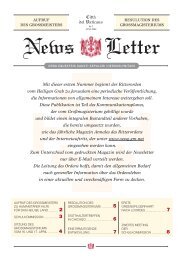
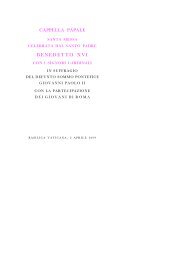
![AAS 01 [1909] - La Santa Sede](https://img.yumpu.com/51456523/1/180x260/aas-01-1909-la-santa-sede.jpg?quality=85)
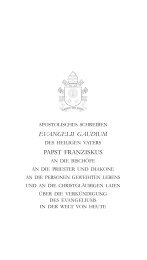
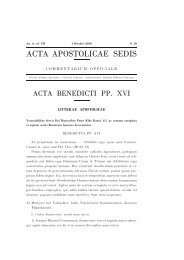
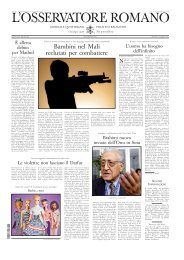
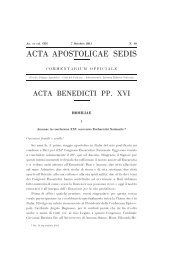
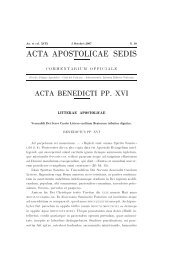
![AAS 20 [1928] - La Santa Sede](https://img.yumpu.com/19772818/1/180x260/aas-20-1928-la-santa-sede.jpg?quality=85)
